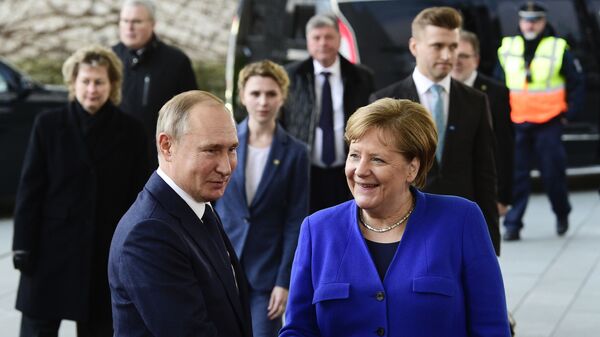Russian President Vladimir Putin and German Chancellor Angela Merkel said during their joint phone call on 15 July that there is "no point" in sanctions' pressure against Iran, according to the Kremlin.
"When discussing Iran, the Russian president emphasised that putting pressure on Tehran with sanctions was pointless, the effort to preserve the Joint Comprehensive Plan of Action on the Iranian Nuclear Program, as approved by UN Security Council resolution 2231 was needed", the Kremlin's press office said.
According to the press office, the two politicians discussed "a number of pressing issues" with regards to bilateral ties, including the coronavirus response.
JCPOA and Sanctions on Iran
The Joint Comprehensive Plan of Action (JCPOA) agreement, known to many simply as the Iran Nuclear Deal, was signed by Iran, Russia, the United States, China, France, Britain, Germany and the European Union, on 14 July 2015. Under the deal, Iran was required to suspend its nuclear programme and cut uranium reserves in exchange for a lifting of sanctions against the country and the ending of the UN arms embargo.
However, the Trump administration unilaterally broke the agreement in May 2018, reintroducing sanctions against Tehran. Initially, Iran urged other signatories to the deal to preserve the JCPOA and said that it would start scrapping some of its commitments if they failed to do so.
Tehran started fulfilling its promise from May 2019 onwards, saying that it would step back from its obligations under the deal each 60 days in the absence of protection from US sanctions. In November 2019, the country doubled the number of centrifuges in its operation and continued enriching uranium to 5%.
Meanwhile, the UK, France and Germany, often referred to as E3, introduced the INSTEX trade mechanism to help facilitate Iran-EU trade despite American sanctions. However, Iranian officials, including Foreign Minister Javad Zarif, repeatedly criticised their European partners for failing to adequately confront economic pressures from the US. "E3 must stop public face-saving & muster the courage to state publicly what they admit privately", Zarif urged in June.
Minsk Agreements
During the phone call, Putin and Merkel also discussed the implementation of the 2014 Minsk agreement which was set to resolve the military confrontation in eastern Ukraine. Putin emphasised during the conversation that it was "counterproductive" of Kiev "to distort the content of the Minsk agreements".
"It was stressed that Kiev's policy on partial implementation of its commitments under this documents leads the talks into a dead end", the Kremlin's press service said. It added that both politicians negatively assessed recent statements by Ukraine calling for a review of the Minsk agreements.
The Minsk Agreements are a series of measures that were initially signed in 2014 by representatives of Ukraine, Russia, the Donetsk People's Republic (DPR), the Luhansk People's Republic (LPR), and the Organization for Security and Co-operation in Europe (OSCE) and backed by the Normandy Format which includes Ukraine, Russia, Germany and France. Their aim is to bring an end to the military actions in eastern Ukraine which have been ongoing since 2014.


